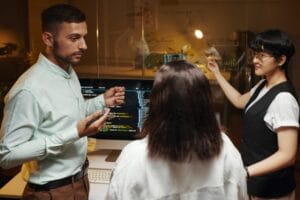Even if AI didn’t invent the wheel, it can definitely reinvent it!
There’s a good chance you’ve already come across an AI tool. What they can do seems almost limitless. Some can generate code, some can make music, and some can create graphic designs. They can even speed up the invention process for inventors.
The growing use of artificial intelligence in the inventive process has naturally raised questions regarding the patentability of AI-based inventions. For instance, to patent them, to what extent can AI be used in the inventive process? Let’s take a closer look.
Table of Contents
ToggleCan AI-Assisted Inventions Be Patented In The US?
Inventors who have used AI to assist them have been granted patents by the United States Patent and Trademark Office (USPTO) for a number of years. For the time being, each case is being dealt with on an individual basis. As there are no special guidelines for AI-assisted patent applications yet, applicants must currently follow the guidelines for computer-implemented inventions. Please note that this could change in the future as the USPTO gains a deeper understanding of AI tools and is able to create specific procedures for these inventions.
To apply for a patent, applicants must include a detailed description explaining how AI contributed to and improved their inventive process. The description should also include the algorithms and the computer hardware that was involved. In any case, applicants must continue to meet the standard requirements for patentability, such as inventiveness and novelty, regardless of whether artificial intelligence is involved.
The Current State Of AI And Patent Law
Incorporating AI systems into patent applications is tricky due to the current patent law requirements. There are, however, a few solutions. AI-related inventions can undergo product-by-process or method-of-use claims. In these approaches, patent attorneys and examiners follow patenting procedures used for chemical and biological inventions.
While the USPTO acknowledges that AI-aided inventions are eligible for patent protection, the extent to how much AI can be involved has not yet been determined. Currently, patents cannot be granted to inventions made entirely by AI machines. In other words, AI-assisted inventions have the potential to be patented when they are used alongside humans, not in place of them.
In order to promote innovation and protect inventors, the USPTO is currently seeking public input on AI inventorship and patentability. As part of their efforts to do so, they are holding stakeholder meetings to discuss AI-assisted inventions, ownership concerns, and potential legislative changes. As the landscape of artificial intelligence continues to develop, their goal is to improve the USPTO’s policies and guidelines based on the feedback they receive.
Although the future of AI and patenting isn’t certain, it’s certain that whatever happens will have a huge impact on both future technologies and how businesses operate, especially those that rely heavily on AI.
If You Need a Consulting Regarding Patenting An AI-Assisted Invention, Sanchelima & Associates Can Help
Sanchelima & Associates, P.A. is one of the leading intellectual property law firms in South Florida. With over 40 years of experience, we have represented the IP interests of a wide array of businesses in the US and abroad, including Fortune 500 companies. Whether you need a consultation or prosecution of a patent, trademark, or copyright, we can protect your business’s interests.
Contact us to book your consultation!


